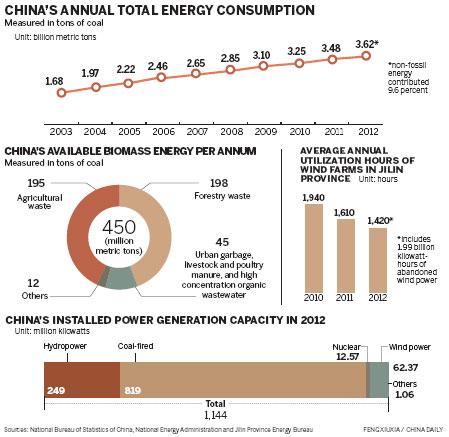 |
Subsidy stalemate
The Ministry of Finance was also tardy with subsidy payments to National Gongzhuling Bio Energy Co Ltd, the project's main investor. National Gongzhuling did not receive the monthly subsidies for 2012 until January this year and is still awaiting the money for April to June. The situation has forced the company to rely on working capital loans to pay local farmers to collect straw, said Du Jiang, deputy general manager of the company.
Because of the oversupply of electricity in Jilin, the Gongzhuling biomass project cut power generation by 13 million kWh between January and July, causing a decline in revenues of 9.75 million yuan.
According to the Renewable Energy Law, power grid enterprises should buy all the grid-connected power generated through renewable energy within the range of their power grids. In practice, however, none of the provincial governments has enforced the law strictly enough, said Zheng from the Jilin provincial energy bureau.
"We don't need government subsidies or policies, but we do want effective enforcement of the renewable energy law," said Zhang of Datang Xiangyang Wind Power Generation Co.
"Given that the law has proved difficult to implement, the National Development and Reform Commission should launch a policy to specify the proportion of power generated with renewable energy - let's say 10 percent of China's total electricity consumption - as soon as possible. In this way, renewable energy will still have plenty of room for further development," said Zheng.
Contact the writer at [email protected]
Wu Wencong and Zhao Xu also contributed to this story.
 |
